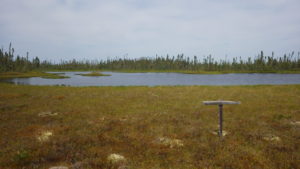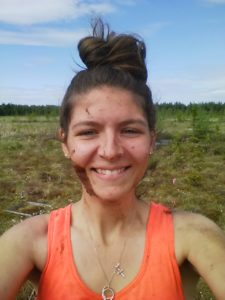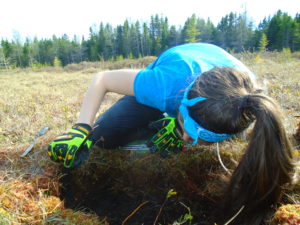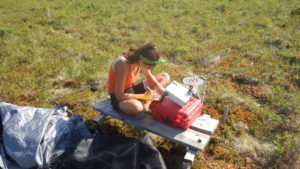These are some of the areas I have been during my studies. I have been everywhere from the Yukon to New Brunswick in Canada to look at moss!
1. What is your background? Where are you from? What do you study? What are you most interested in, scientifically?
I am a PhD candidate at the University of Waterloo in Canada and I have studied peatland restoration hydrology and ecology since my undergraduate degree. I am most interested in the intersection between hydrology and ecology in peatland ecosystems. Right now I am focused on defining peatland restoration success in Canada and I am hoping to use plant functional traits to do that!
In non-science terms: I play in the mud!
2. What are your goals for the upcoming course in Peru? How will you know if you’ve met these goals?
My first goal for this course in Peru is to learn more about plant functional traits in general. Plant functional traits are a hot topic in ecology and I want to learn more about the gaps in plant functional traits literature, and how my research will fit into this realm of research. Through the assigned readings I have already learned some of this and I think I will learn more through the discussions in Peru. I will know when I have met this goal when I have a concrete answer of how my research fits within the context of plant functional traits literature.
I also want to learn more about data documentation and how to make my data as transparent as possible. I am working on this retroactively for my masters and undergraduate work and it is taking a significant amount of time! It will be great to learn how to do this as I go instead of doing it retroactively. I will know I have met this goal when I can apply what I have learned when creating my own data documentation plan for my PhD work.
Data collection: moss height, carbon fluxes, vegetation surveys
3. What are you most excited about, with respect to the upcoming course and trip?
I am most excited to visit a new country – especially since it is Peru!! I have traveled a lot in Canada and a little bit in the United States but not anywhere else. I am very excited to learn more about another culture and to witness another way of life. I also love plants and I love that this course will allow me to get to know Peru through its native plants. Also alpacas & llamas!!!!
4. What do you anticipate people will think about climate change in Peru? Do you think most people will accept that the planet is warming, and that this is largely being caused by human activities? Or will this topic be controversial?
I do not have any experience with views on climate change outside of the North American context. Generally the level of education is generally low in Peru and so I would not be surprised if locals are not aware of climate change per se. That being said, people who work the land have a deep connection to the land and it is possible that they have experienced the effects of climate change. I think that climate change may be a controversial topic – the locals may feel the effects of climate change and may also recognize that they are largely not responsible for it!
5. What do you know about public perceptions of climate change in your home country? What, if anything, have you experienced related to public perceptions of climate change?
In Canada there is still a debate about the realities of climate change. Some of our older generation and more conservative people are having a difficult time accepting that climate change is real and that we are responsible. Though a lot of our people do accept that climate change is real, most people are not willing to take the necessary steps to make tangible greenhouse gas reductions. Tackling climate change takes a cultural shift and this shift will take time.






